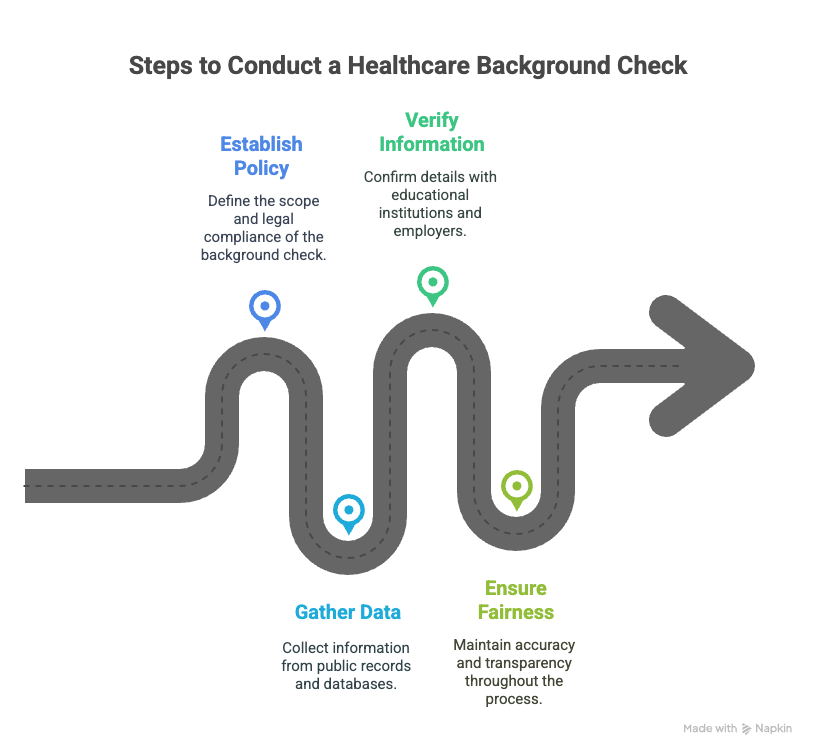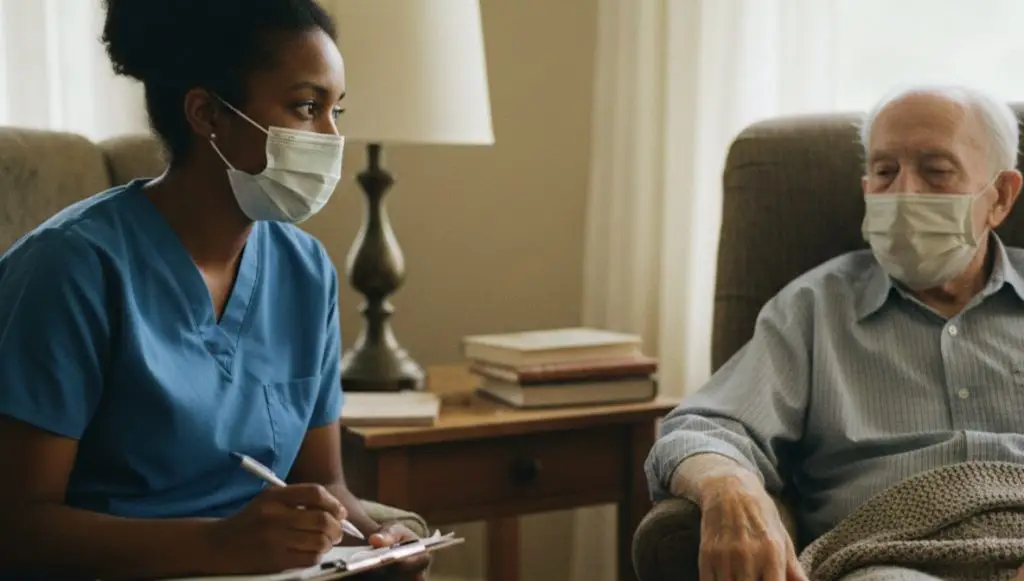Welcome to the complex world of healthcare hiring, where ensuring the right team is both an ethical obligation and a legal necessity. Dive into this guide to learn why healthcare background checks are crucial for maintaining a safe, compliant, and efficient environment.
Key Takeaways
- Rigorous background checks in healthcare protect patient safety by preventing hires with histories of abuse or malpractice.
- Legal compliance with regulations, such as the FCRA and OIG Exclusion List, shields your facility from fines and enhances public trust.
- A thorough background check process, including criminal history, credential verification, and drug testing, ensures your staff is both qualified and safe.
- Effective screening practices involve clear policies, use of technology, and collaboration with various stakeholders to ensure consistency and accuracy.
- Implementing robust background checks elevates your facility's reputation, ensuring a committed and trustworthy healthcare team.
Introduction
One in four healthcare workers has a history of criminal activity, affecting trust and patient safety. With such statistics, healthcare background checks aren't just a formality—they're an essential safeguard. These checks ensure that all staff and practitioners hold the qualifications and character needed for this responsibility-heavy field. Background checks encompass criminal history, credential verification, and drug testing, among other components, providing a complete view of candidates. This guide will walk you through the crucial steps and reasons to perform these checks, benefiting both employers and employees in the healthcare sector.
EXPERT INSIGHT: Background screening in health staffing fosters trust. As HR professioanls, we are hiring people who impact lives. The assurance that comes from knowing a nurse, physician, or technician has been fairly and thoroughly vetted is priceless—for patients, families, and the whole care team. Background checks should not be seen as tools of gatekeeping; rather, they preserve dignity, safety, and care in the deepest possible sense. When done the right way, they do not just mitigate risk but also support the mission of healing. - Charm Paz, CHRP
The Importance of Healthcare Background Checks
Patient safety is your primary concern. In healthcare, a simple oversight can lead to significant harm. Rigorous background checks are your first line of defense against that. By thoroughly vetting potential hires, you protect patients from abuse, neglect, or incompetence. Take the example of a nurse with a history of patient mistreatment that went unnoticed due to lax screening. Unfortunately, such cases are not uncommon. A comprehensive check could prevent similar incidents and ensure the right individuals are caring for your patients.
Compliance and regulation aren't just bureaucratic red tape. They're there to protect both your institution and your patients. You're likely familiar with requirements like the Joint Commission's standards or state-specific laws that mandate background checks. Proper adherence helps you avoid hefty fines and legal troubles. More importantly, it guarantees your staff meets the professional and ethical standards your patients deserve.
Your facility's reputation matters as much as its operational efficiency. Trustworthy staff enhance your institution’s credibility. An incident involving an ill-vetted employee can tarnish public trust and negatively impact patient influx. Maintaining stringent screening processes confirms your commitment to safety and quality care, setting your facility apart as a reliable healthcare provider.
Are you taking all necessary steps to safeguard those who rely on you?
What Are Healthcare Background Checks?
Healthcare background checks are comprehensive reviews intended to ensure the safety and integrity of healthcare environments. At their core, these checks assess a candidate's history to confirm they meet the necessary standards for patient safety and compliance.
Key components include criminal background checks, credential verification, and drug testing. Criminal background checks look for past offenses that might endanger patients or other staff members. Credential verification ensures that the medical professional holds valid and current licenses relevant to their role. Meanwhile, drug testing confirms that the candidate is free from substances that could impair their judgment or ability to perform.
For example, screening may involve checking medical licenses for validity and confirming they haven't been revoked or suspended. Screening processes often include reviewing databases like the OIG Exclusion List, which identifies individuals prohibited from participating in federally funded healthcare programs due to past misconduct.
Understanding these components helps you ensure that your healthcare facility recruits staff who are both qualified and safe. Have you considered how thorough your current process is? Reflect on where gaps may exist and what improvements could be made to enhance safety and compliance.
The Process of Conducting a Healthcare Background Check
You've decided to hire for a healthcare position. Before making any decisions, there are essential steps to follow for a thorough background check. Start with a clear policy. Outline what you want to know about your candidates, always considering compliance with laws.
To gather data, look at public records, professional registries, and industry-specific databases. These include criminal records, licensing boards, and exclusion lists from government agencies. Ensure you're using reputable sources to get the most accurate information.
Verification is critical. Contact educational institutions to confirm degrees, and reach out to former employers to verify work history. This step minimizes misinformation and builds a clearer candidate profile.
Balance must guide your process. While the need for due diligence is strong, remember the importance of fairness and accuracy. Mistakes can have serious consequences, both for candidates and your organization. Aim for precision and transparency in every step, ensuring a fair process.

For further reading, check out common background check questions to refine your understanding.
Legal and Compliance Aspects
The Fair Credit Reporting Act (FCRA) is crucial for healthcare background checks. It ensures that employers handle background check information responsibly. You must provide job candidates with a clear notice and obtain their written consent before conducting a background check. If you decide not to hire someone based on the results, you're required to share those results with the candidate and explain their rights to dispute inaccurate information.
Compliance with the Equal Employment Opportunity Commission (EEOC) guidelines is also vital. These guidelines protect candidates from discrimination based on race, color, national origin, sex, or religion during the hiring process. You can learn more about the EEOC's recommendations on their official website.
Checking the OIG Exclusion List is non-negotiable. This list contains names of individuals and entities barred from participating in federal healthcare programs due to fraud or abuse. Hiring someone on this list can lead to severe penalties, including exclusion from Medicare and Medicaid. Regularly reviewing the OIG list protects your institution from legal repercussions and maintains your facility's integrity.
Challenges in Healthcare Background Checks
Navigating through the challenges of healthcare background checks often requires a practiced approach. False positives can arise due to mistaken identities or outdated records. When John Smith’s criminal past is linked incorrectly to another John Smith, it can result in undeserved disqualification. To mitigate this, use multiple identifiers such as date of birth and social security number.
Privacy concerns are another significant hurdle. You must respect applicants' privacy while performing thorough checks. This involves adhering strictly to legal requirements and obtaining explicit consent. The Fair Credit Reporting Act provides a framework to ensure checks are both comprehensive and respectful.
Think about the balance between thoroughness and fairness. Does your process allow for candidates to dispute findings? Ensuring a quick resolution to disputes helps maintain fairness and credibility. How you navigate these challenges defines the effectiveness of your background checks and, ultimately, the quality of your hires.
Implementing Effective Screening Practices
Implementing effective screening practices in healthcare requires clarity and consistency. Start by establishing clear policies that outline what your checks will cover. Criminal record searches, employment history, and credential verification should form the basic framework.
Adopt a structured approach. Use standardized processes across all departments to avoid discrepancies. Consistency not only reduces risk but also ensures compliance with legal requirements.
Integrate technology to streamline your processes. Automated systems can handle large volumes of data quickly and accurately, identifying discrepancies that might slip through manual checks. Software solutions can also keep you updated with the latest legal amendments.
Continuous monitoring is crucial. A clear, actionable strategy should be in place for ongoing checks even after the hire. Regular updates can catch new issues, such as recent criminal charges or expired licenses, that might affect an employee's suitability.
Involve multiple stakeholders. Collaborate with legal advisors, HR, and compliance officers to create comprehensive protocols. Their input can help identify risk areas and modify processes as needed.
By employing these practical steps, you safeguard your patients and bolster your facility's reputation. Are your current screening processes effective? Could they be streamlined or expanded to improve oversight? Keeping these questions in mind ensures your approach remains grounded and focused on safety and compliance.
Conclusion
Healthcare background checks are more than a bureaucratic hurdle. They're a pivotal part of ensuring the safety and integrity of healthcare facilities. Every aspect, from verifying credentials to checking criminal records, contributes to a safer environment for patients and staff.
Thorough background checks help instill trust. Patients and their families deserve confidence in those providing their care. Additionally, adhering to compliance standards protects facilities from legal repercussions and strengthens public trust.
Effective background checks also benefit employees. A transparent process sets clear professional expectations and creates a level playing field. It helps to maintain a culture of accountability and excellence.
Your healthcare facility’s reputation hinges on the quality and character of your team. Therefore, it's crucial to integrate robust screening practices into your hiring processes. As you refine these practices, remember that a strong foundation in background checks is essential not just for compliance, but for building a truly reliable and effective healthcare workforce.
Frequently Asked Questions (FAQs)
Why are background checks important in healthcare?
Background checks are essential in healthcare to ensure patient safety and trust. They help identify any potential risks associated with a candidate, such as past criminal activity or fraudulent work history. By verifying credentials and past behavior, healthcare facilities can maintain a safe and trustworthy environment for patients and staff.
What is included in a healthcare background check?
A healthcare background check typically includes criminal history searches, verification of education and employment history, license verification, and reference checks. It may also involve drug screening and checks against sex offender registries. These checks ensure that healthcare professionals meet the legal and professional standards required for their roles.
What is the OIG exclusion list?
The OIG exclusion list is a database maintained by the Office of Inspector General. It includes individuals and entities excluded from participating in federal healthcare programs due to fraud, patient abuse, or other misconduct. Healthcare employers use this list to avoid hiring excluded individuals, which could lead to penalties or the loss of federal program participation.
How often should healthcare workers be re-screened?
Healthcare workers should be re-screened at least annually, depending on the facility's policies and the level of patient interaction involved in their roles. Regular re-screening helps ensure ongoing compliance with regulations and awareness of any new legal issues or changes in credentials.
Are background checks required for nurses and CNAs?
Yes, background checks are required for nurses and Certified Nursing Assistants (CNAs). Licensing boards and healthcare facilities mandate these checks to verify qualifications and ensure that individuals do not pose a risk to patient safety.
What happens if a healthcare worker fails a background check?
If a healthcare worker fails a background check, they may be disqualified from employment or face termination if already employed. The specific outcome depends on the nature and severity of the issue found in their background.
Can background checks vary by state?
Yes, background check requirements can vary by state. Each state has its own regulations and standards for healthcare employment, which can affect the scope and process of the checks conducted.
What role do references play in healthcare background checks?
References provide insights into a candidate’s work ethic, reliability, and past job performance. They help confirm details about a candidate's professional history and assess their suitability for the role.
Do background checks include social media reviews?
Some healthcare employers may review a candidate's social media presence as part of the background check process. This can help identify any unprofessional behavior that could affect their suitability for a healthcare role. However, this practice varies by organization.
Definitions
Background Check
A background check is a review of a candidate’s personal and professional history to assess their suitability for a role. In healthcare, this often includes examining criminal records, verifying credentials, and checking for drug use. Employers use this process to make informed hiring decisions and reduce the risk to patients or staff. For example, discovering a revoked license through this check could prevent a risky hire.
Credential Verification
Credential verification confirms that a healthcare professional holds valid licenses, degrees, and certifications relevant to their role. This process often includes contacting licensing boards and education institutions. It ensures the person is qualified to deliver care. A nurse, for instance, must have an active license in the state where they work.
Drug Testing
Drug testing checks if a candidate or employee is using substances that could impair their ability to perform safely. Many healthcare roles require this test because even a small lapse in judgment can harm patients. Testing helps maintain a safe and dependable work environment, especially in roles involving surgery or medication dispensing.
OIG Exclusion List
This government-maintained list includes individuals and organizations barred from participating in federally funded healthcare programs. Reasons include past fraud, abuse, or license revocation. Hiring someone on this list can lead to severe legal and financial penalties. Checking it helps protect your facility’s compliance and credibility.
Fair Credit Reporting Act (FCRA)
The FCRA is a federal law that outlines how organizations can collect and use background information for employment. It requires employers to get written consent before running a background check and to inform candidates about any negative findings. If a candidate disputes the results, they have the right to correct them. This law promotes fairness and transparency in hiring.
References

GCheck Editorial Team
Meet the GCheck Editorial Team, your trusted source for insightful and up-to-date information in the world of employment background checks. Committed to delivering the latest trends, best practices, and industry insights, our team is dedicated to keeping you informed.
With a passion for ensuring accuracy, compliance, and efficiency in background screening, we are your go-to experts in the field. Stay tuned for our comprehensive articles, guides, and analysis, designed to empower businesses and individuals with the knowledge they need to make informed decisions.
At GCheck, we're here to guide you through the complexities of background checks, every step of the way.






